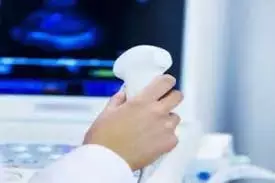- Home
- Medical news & Guidelines
- Anesthesiology
- Cardiology and CTVS
- Critical Care
- Dentistry
- Dermatology
- Diabetes and Endocrinology
- ENT
- Gastroenterology
- Medicine
- Nephrology
- Neurology
- Obstretics-Gynaecology
- Oncology
- Ophthalmology
- Orthopaedics
- Pediatrics-Neonatology
- Psychiatry
- Pulmonology
- Radiology
- Surgery
- Urology
- Laboratory Medicine
- Diet
- Nursing
- Paramedical
- Physiotherapy
- Health news
- Fact Check
- Bone Health Fact Check
- Brain Health Fact Check
- Cancer Related Fact Check
- Child Care Fact Check
- Dental and oral health fact check
- Diabetes and metabolic health fact check
- Diet and Nutrition Fact Check
- Eye and ENT Care Fact Check
- Fitness fact check
- Gut health fact check
- Heart health fact check
- Kidney health fact check
- Medical education fact check
- Men's health fact check
- Respiratory fact check
- Skin and hair care fact check
- Vaccine and Immunization fact check
- Women's health fact check
- AYUSH
- State News
- Andaman and Nicobar Islands
- Andhra Pradesh
- Arunachal Pradesh
- Assam
- Bihar
- Chandigarh
- Chattisgarh
- Dadra and Nagar Haveli
- Daman and Diu
- Delhi
- Goa
- Gujarat
- Haryana
- Himachal Pradesh
- Jammu & Kashmir
- Jharkhand
- Karnataka
- Kerala
- Ladakh
- Lakshadweep
- Madhya Pradesh
- Maharashtra
- Manipur
- Meghalaya
- Mizoram
- Nagaland
- Odisha
- Puducherry
- Punjab
- Rajasthan
- Sikkim
- Tamil Nadu
- Telangana
- Tripura
- Uttar Pradesh
- Uttrakhand
- West Bengal
- Medical Education
- Industry
Vascular ultrasound reliable option for diagnosing giant cell arteritis: Lancet Study

A new study has revealed that vascular ultrasonography may successfully substitute temporal artery biopsy as a first-line diagnostic technique in patients suspected of having giant cell arteritis,when performed by professionally educated ultrasonographers utilizing suitable equipment and settings.
This study was conducted by Stavros Chrysidis & team and the findings were published in The Lancet Rheumatology on 26th October, 2021.
Despite the fact that roughly 39 percent of patients who are negative for the illness by biopsy are later given a clinical diagnosis of giant cell arteritis, temporal artery biopsy is regarded the diagnostic gold standard for giant cell arteritis. As a result, the purpose of this study was to evaluate the diagnostic accuracy of ultrasonography examination in patients with suspected giant cell arteritis.
In this study, researchers recruited patients with clinically suspected giant cell arteritis from three Danish hospitals. Bilateral ultrasounds of the temporal, facial, common carotid, and axillary arteries were performed on participants. Ultrasounds were performed by professionals who had been well educated in vascular ultrasonography and who used suitable equipment and settings. Within 7 days of starting corticosteroid medication, participants had a temporal artery biopsy.
All ultrasound pictures were evaluated by a blinded ultrasonography professional. Ultrasound vasculitis was defined in the cranial arteries as a homogeneous, hypoechoic intimamedia complex thickness and a positive compression sign, and in the axillary arteries as a homogeneous intimamedia complex of 1 mm thickness or wider and 15 mm thickness or wider in the common carotid artery.
Participants were followed up with six months afterwards. During this six-month period, physicians were able to collect data from all clinical evaluations, allowing for a thorough clinical diagnosis at the end of the six-month period. The expert judgement of the treating rheumatologist was used to make the clinical diagnosis. The diagnostic criteria standard was a verified diagnosis after 6 months of follow-up. The odds ratio and 95 percent CI of ultrasonography as a predictor of giant cell arteritis were calculated using logistic regression analysis.
- At 6 months, 46 (43%) of 106 patients had a positive temporal artery biopsy, and 62 (58%) of 106 patients had a clinically confirmed diagnosis of giant cell arteritis (temporal artery biopsy sensitivity 74%, specificity 100%).
- Cranial artery ultrasound was positive in all patients who had a positive temporal artery biopsy, and seven (58%) of 12 patients who were positive by ultrasound but negative by temporal artery biopsy were diagnosed with large-vessel giant cell arteritis using other imaging modalities.
- The ultrasound diagnosis of giant cell arteritis has a sensitivity of 94% (84–98) and a specificity of 84% (70–93). At 6 months, a logistic regression analysis indicated that ultrasonography was the best baseline predictor of a clinically confirmed diagnosis of giant cell arteritis.
"In patients with suspected giant cell arteritis, vascular ultrasound of cranial arteries and large vessels performed by of trained ultrasonographers using high-end equipment and optimized settings has high diagnostic sensitivity and specificity, and it may replace invasive temporal artery biopsy as a first-line diagnostic method," and "In the future, implementation studies may be required to assess the applicability of these strategies to health care on a global scale," the Authors added in conclusion.
Reference:
Chrysidis, S., Døhn, U. M., Terslev, L., Fredberg, U., Lorenzen, T., Christensen, R., Larsen, K., & Diamantopoulos, A. P. (2021). Diagnostic accuracy of vascular ultrasound in patients with suspected giant cell arteritis (EUREKA): a prospective, multicentre, non-interventional, cohort study. In The Lancet Rheumatology (Vol. 3, Issue 12, pp. e865–e873). Elsevier BV. https://doi.org/10.1016/s2665-9913(21)00246-0
Medical Dialogues consists of a team of passionate medical/scientific writers, led by doctors and healthcare researchers. Our team efforts to bring you updated and timely news about the important happenings of the medical and healthcare sector. Our editorial team can be reached at editorial@medicaldialogues.in.
Dr Kamal Kant Kohli-MBBS, DTCD- a chest specialist with more than 30 years of practice and a flair for writing clinical articles, Dr Kamal Kant Kohli joined Medical Dialogues as a Chief Editor of Medical News. Besides writing articles, as an editor, he proofreads and verifies all the medical content published on Medical Dialogues including those coming from journals, studies,medical conferences,guidelines etc. Email: drkohli@medicaldialogues.in. Contact no. 011-43720751


